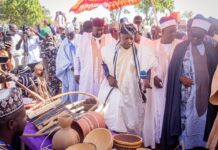“Today, we are conscious of the necessity for the workers of Nigeria to come together and to remain under one umbrella”.
– Mr. Okon Eshiett’s moving graveside oration at the burial of the late Chief J.A. Oduleye at Apena Cemetery, Lagos 1975 also known as APENA DECLARATION
Precisely because yours comradely is involved, I bear witness that it was commendable that the November 2017 NEC of NLC unanimously adopted the resolution to celebrate NLC at forty. NLC commences a number of manifestations to mark its fortieth anniversary this week. The historic programme of activities starts with the State councils’ events this week scheduled to end by Sunday 25th February 2018 while at the national level events that include prayers in the mosque on Friday and Sunday climaxed with Monday 26th February 2018 a Public Lecture on “NLC @ 40: Yesterday, Today and Tomorrow, National Unity and Social Justice.” The second public lecture takes place on Tuesday 27th February. Mr. Guy Ryder, the Director General of the ILO is expected to deliver the lecture on “The Future of the World of Work”, the topic that “coincides with the theme of the centenary celebration of the ILO worldwide, which turns a hundred years in 2019 since its creation after the First World War as a United Nations specialized institution dedicated to tripartism and world assembly regulating the World of Work”.
The final activity is another Public Lecture on “Labour, Politics and Governance”. It has been globally acknowledged that institution building is the hallmark of nation building. But often the focus is on the state institutions. NLC is a non-state institution that has come of age in defense of the interests of its working and retired members. Barack Obama was the 44th President of USA. During his historic visit to Ghana in 2009, he admonished Africans to build strong institutions in place of strong men. If Obama was aware of the history of labour movement in Africa such as NLC’s he would have known that African workers despite the enormous challenges of organizing have been building strong organizations with strong working women and men.
Unarguably, NLC remains the biggest labour centre in Nigeria and indeed in Africa with over 7 million organized and potential 40 million members! The Anniversary celebrations obviously raise the question of instructional memory which is increasingly on the decline in Nigeria and Africa. Organizational birthdays are occasions to celebrate the past achievements and set the agenda for the future. 40th anniversary celebration offers the opportunity to present NLC for both the beginners and veterans alike. First is the question of history. It will be rhetorical to still ask the question; how old really is NLC? The point must be made that NLC in celebration at 40 from this week is the Nigeria Labour Congress which emerged out of the controversial unique 1975-1978 state intervention and restructuring of the hitherto four labour centers under Murtala/Obasanjo military regime. Just as capital, employers and owners of means of production are concentrating power and efforts aimed at maximizing profits so also workers and their unions have seen the urgent need to form national and international organizations aimed at maximizing labour’s welfare and curtail exploitation under capitalism.
To this end under British colonialism, the first generation of unionists saw the need not only to form trade based/house unions but also central national labour organizations that could confront colonial capital with its exploitation and oppressions. The first Nigeria Nigeria Labour Congress first formed in 1950. The inaugural conference of the second NLC was on December 18th, 1975 at the Banquet Hall of the Lagos City Council. The second NLC was formed on the ashes of the then existing four labour centers, namely – United Labour Congress (ULC), Nigeria Trade Union Congress (NTUC), Nigeria Workers’ Council (NWC) and Labour Unity Front (LUF). The independent efforts at one indivisible labour centre were propelled by great veteran unionists like Alhaji H.P. Adebola, late Wahab Goodluck, S.U. Bassey, J.O. James, N.F. Pepple, A.I. Okwese, Chief E.A.O Odeyemi, M.A. Imoudu, J.U. Akpan, R.A. Ramos, Okon Esshiett and Vincent Igwe Jack.
The second NLC was inspired by the great oration delivered by late Mr. Okon Eshiett then Director of Trade Union Institute (TUI), at the burial of the late Chief J.A. Oduleye at Apena Cemetry, Lagos 1975 known as APENA DECLARATION. I suggest that NLC should make that historic oration a compulsory read for all labour leaders if we must sustain the historic efforts at strong united labour centre. The efforts at one new NLC were successful until the then Federal Commissioner for Labour, under the Administration of General Murtala Mohammed, Major General Henry Adefowope announced new Federal military Government’s “Labour Policy of limited Government Intervention and Guided Democracy in Trade Union matters” which eventually led to wholesale restructuring of the then existing hundreds of house unions into national industrials union. 2018 is definitely a year of celebration of not just NLC but all 43 industrial unions in both private and public sectors affiliated to the NLC at restructured NLC in 1978.
Issa Aremu mni



